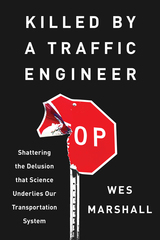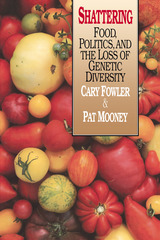2 books about Shattering

Killed by a Traffic Engineer
Shattering the Delusion that Science Underlies our Transportation System
Wes Marshall
Island Press, 2024
In the US we are nearing four million road deaths since we began counting them in 1899. The numbers are getting worse in recent years, yet we continue to accept these deaths as part of doing business. There has been no examination of why we engineer roads that are literally killing us.
Fixing the carnage on our roadways requires a change in mindset and a dramatic transformation of transportation. This goes for traffic engineers in particular because they are still the ones in charge of our streets.
In Killed by a Traffic Engineer, civil engineering professor Wes Marshall shines a spotlight on how little science there is behind the way that our streets are engineered, which leaves safety as an afterthought. While traffic engineers are not trying to cause deliberate harm to anyone, he explains, they are guilty of creating a transportation system whose designs remain largely based on plausible, but unproven, conjecture.
Thoroughly researched and compellingly written, Killed by a Traffic Engineer shows how traffic engineering “research” is outdated and unexamined (at its best) and often steered by an industry and culture considering only how to get from point A to B the fastest way possible, to the detriment of safety, quality of life, equality, and planetary health. Marshall examines our need for speed and how traffic engineers disconnected it from safety, the focus on capacity and how it influences design, blaming human error, relying on faulty data, how liability drives reporting, measuring road safety outcomes, and the education (and reeducation) of traffic engineers.
Killed by a Traffic Engineer is ultimately hopeful about what is possible once we shift our thinking and demand streets engineered for the safety of people, both outside and inside of cars. It will make you look at your city and streets—and traffic engineers— in a new light and inspire you to take action.
Fixing the carnage on our roadways requires a change in mindset and a dramatic transformation of transportation. This goes for traffic engineers in particular because they are still the ones in charge of our streets.
In Killed by a Traffic Engineer, civil engineering professor Wes Marshall shines a spotlight on how little science there is behind the way that our streets are engineered, which leaves safety as an afterthought. While traffic engineers are not trying to cause deliberate harm to anyone, he explains, they are guilty of creating a transportation system whose designs remain largely based on plausible, but unproven, conjecture.
Thoroughly researched and compellingly written, Killed by a Traffic Engineer shows how traffic engineering “research” is outdated and unexamined (at its best) and often steered by an industry and culture considering only how to get from point A to B the fastest way possible, to the detriment of safety, quality of life, equality, and planetary health. Marshall examines our need for speed and how traffic engineers disconnected it from safety, the focus on capacity and how it influences design, blaming human error, relying on faulty data, how liability drives reporting, measuring road safety outcomes, and the education (and reeducation) of traffic engineers.
Killed by a Traffic Engineer is ultimately hopeful about what is possible once we shift our thinking and demand streets engineered for the safety of people, both outside and inside of cars. It will make you look at your city and streets—and traffic engineers— in a new light and inspire you to take action.
[more]

Shattering
Food, Politics, and the Loss of Genetic Diversity
Cary Fowler and Pat Mooney
University of Arizona Press, 1990
It was through control of the shattering of wild seeds that humans first domesticated plants. Now control over those very plants threatens to shatter the world's food supply, as loss of genetic diversity sets the stage for widespread hunger.
Large-scale agriculture has come to favor uniformity in food crops. More than 7,000 U.S. apple varieties once grew in American orchards; 6,000 of them are no longer available. Every broccoli variety offered through seed catalogs in 1900 has now disappeared. As the international genetics supply industry absorbs seed companies—with nearly one thousand takeovers since 1970—this trend toward uniformity seems likely to continue; and as third world agriculture is brought in line with international business interests, the gene pools of humanity's most basic foods are threatened.
The consequences are more than culinary. Without the genetic diversity from which farmers traditionally breed for resistance to diseases, crops are more susceptible to the spread of pestilence. Tragedies like the Irish Potato Famine may be thought of today as ancient history; yet the U.S. corn blight of 1970 shows that technologically based agribusiness is a breeding ground for disaster.
Shattering reviews the development of genetic diversity over 10,000 years of human agriculture, then exposes its loss in our lifetime at the hands of political and economic forces. The possibility of crisis is real; this book shows that it may not be too late to avert it.
Large-scale agriculture has come to favor uniformity in food crops. More than 7,000 U.S. apple varieties once grew in American orchards; 6,000 of them are no longer available. Every broccoli variety offered through seed catalogs in 1900 has now disappeared. As the international genetics supply industry absorbs seed companies—with nearly one thousand takeovers since 1970—this trend toward uniformity seems likely to continue; and as third world agriculture is brought in line with international business interests, the gene pools of humanity's most basic foods are threatened.
The consequences are more than culinary. Without the genetic diversity from which farmers traditionally breed for resistance to diseases, crops are more susceptible to the spread of pestilence. Tragedies like the Irish Potato Famine may be thought of today as ancient history; yet the U.S. corn blight of 1970 shows that technologically based agribusiness is a breeding ground for disaster.
Shattering reviews the development of genetic diversity over 10,000 years of human agriculture, then exposes its loss in our lifetime at the hands of political and economic forces. The possibility of crisis is real; this book shows that it may not be too late to avert it.
[more]
READERS
Browse our collection.
PUBLISHERS
See BiblioVault's publisher services.
STUDENT SERVICES
Files for college accessibility offices.
UChicago Accessibility Resources
home | accessibility | search | about | contact us
BiblioVault ® 2001 - 2024
The University of Chicago Press









